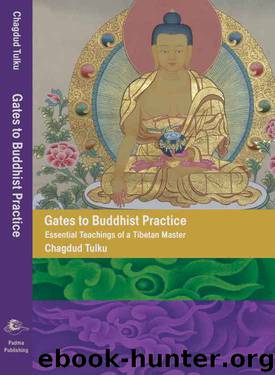Gates to Buddhist Practice: Essential Teachings of a Tibetan Master (Revised Edition) by Chagdud Tulku

Author:Chagdud Tulku [Tulku, Chagdud]
Language: eng
Format: epub
Publisher: Padma Publishing
Published: 2015-02-07T02:00:00+00:00
15
Wishing and Engaging Bodhicitta
Bodhicitta has two frameworks: the welfare of others, or compassion; and enlightenment, or wisdom. We wish for enlightenment not just to escape samsara but also to benefit whoever sees, hears, touches, or remembers us. Right now we might have the ability to help ten, a hundred, a thousand, or, if we are famous, perhaps millions of people. But that isn’t enough. Limitless beings suffer throughout samsara.
When we practice, we can give rise to one of three forms of bodhicitta. We call the first the shepherd-like attitude, in that our motivation is to follow those we’re guiding to enlightenment just as a shepherd herds his sheep through the gate, then follows after. The second is called the ferryman’s or boatman’s attitude. In crossing a river, the boatman arrives at the opposite shore at the same time as his passengers. In the same way, we reach enlightenment together. Realistically, however, in order to free others from the cycles of existence, we must first free ourselves. Just as a king assumes the throne first and then rules the kingdom wisely, in our practice we aspire to attain buddhahood ourselves so that we can free others from samsara. This is known as the kingly attitude. We cultivate one or the other of these forms of bodhicitta to counteract various degrees of self-clinging, the greatest single impediment to enlightenment.
Aspiring to attain enlightenment for ourselves and all beings is called wishing bodhicitta. Although essential to our practice, it alone will not accomplish our goal. Wishing bodhicitta is like looking at the vast ocean of samsara and wanting to get ourselves and others to the opposite shore. If we don’t have a boat and a means to propel it, no amount of wishing will get us across.
We must also become actively involved—we have to actually enter the path of practice. Fully utilizing the methods that reduce and purify negative thoughts and actions and enhance positive qualities, while simultaneously recognizing the true nature of mind so that we can liberate ourselves and others is called engaging bodhicitta. This is the way of the bodhisattva.
One method of incorporating bodhicitta into every aspect of our lives is to practice the six perfections (in Sanskrit, paramitas): generosity, moral discipline, patience, diligence, concentration, and wisdom.
Generosity loosens our grip on the things we cling to. There is the material generosity of sharing food, clothing, and other things of substance; the spiritual generosity of imparting spiritual teachings, of providing freedom from fear and protection to those who are afraid; and the generosity of effort, giving freely of our time and energy as well as our words in sharing, teaching, counseling, and expressing loving kindness to benefit others. Whatever fortune we presently enjoy is the fruit of our past generosity, which we can now rejoice in sharing.
In the practice of moral discipline, we continually check our motivation to ensure that we use our body, speech, and mind skillfully, that we are not only truly harmless but helpful. In addition, we strive to
Download
This site does not store any files on its server. We only index and link to content provided by other sites. Please contact the content providers to delete copyright contents if any and email us, we'll remove relevant links or contents immediately.
The Way of Zen by Alan W. Watts(5790)
Ego Is the Enemy by Ryan Holiday(3982)
The Art of Happiness by The Dalai Lama(3378)
The Book of Joy by Dalai Lama(3212)
Why Buddhism is True by Robert Wright(2820)
Shift into Freedom by Loch Kelly(2688)
Spark Joy by Marie Kondo(2671)
Happiness by Matthieu Ricard(2516)
A Monk's Guide to a Clean House and Mind by Shoukei Matsumoto(2400)
The Lost Art of Good Conversation by Sakyong Mipham(2124)
The Meaning of the Library by unknow(2064)
The Third Eye by T. Lobsang Rampa(1882)
The Unfettered Mind: Writings from a Zen Master to a Master Swordsman by Takuan Soho(1858)
Anthology by T J(1750)
Red Shambhala by Andrei Znamenski(1745)
The Diamond Cutter by Geshe Michael Roach(1668)
Thoughts Without A Thinker: Psychotherapy from a Buddhist Perspective by Epstein Mark(1589)
Advice Not Given by Mark Epstein(1519)
Twilight of Idols and Anti-Christ by Friedrich Nietzsche(1488)
